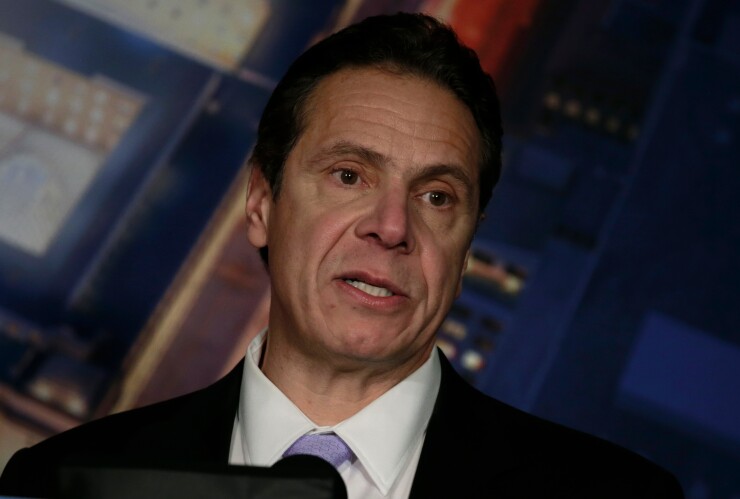
New York City should ramp up its contribution to the Metropolitan Transportation Authority's five-year capital program to $3 billion, Gov. Andrew Cuomo said Thursday night.
That's way up from the city's recent commitment of $657 million over that period in its own financial plan.
"The city's financial condition is much different than it was previously," Cuomo said on television station NY1, shortly after MTA chairman Thomas Prendergast proposed multi-tiered funding solution to the $14 billion gap in the authority's proposed $32 billion capital program — $3 billion of that is self-funded through bridge and toll revenue.
Thursday's developments marked the latest in the triangular drama among Cuomo's office, the city, and the agency that operates the city's subways, buses and commuter trains, seven bridges and two tunnels.
A state capital program review board last fall rejected the proposal without prejudice. The MTA, though it largely serves the New York City region, is a state agency. It is also one of the largest municipal issuers with about $35 billion in debt.
"City funding of the MTA's operating and capital finance needs has been seriously deficient for many years," Prendergast wrote state budget Director Mary Beth Labate and city First Deputy Mayor Anthony Shorris. "However, over the past decade the city's finances have greatly improved and today the city has greater revenue surpluses than the state."
According to Prendergast, savings from alternative project delivery methods such as design-build and public-private partnerships — a point of emphasis from Albany — plus existing MTA resources including federal aid, previously committed city and state aid, and MTA cash and bonding capacity, could cover all but $9.8 billion.
"He scrubbed the budget," Cuomo said of Prendergast.
The MTA chairman suggested the state and city split the rest.
"I could argue that it's a little burdensome on the state. But I would accept the MTA's numbers just to get it done," said Cuomo. "The city ends up paying a fraction of what the state would be spending, so I think it is fair and it allows us to resolve the matter and move forward. The city would be a total of about $3 billion at the end of the day so it is, I think, more than fair to the city."
Shorris earlier in the week wrote Prendergast expressing interest is discussing funding options, which he said include the MoveNY toll-swap and congestion-pricing initiative championed by former city transportation commissioner "Gridlock Sam" Schwartz. He also suggested a surcharge on livery service companies such as tech-oriented Uber to help fund mass transit.
In the spring, Prendergast requested $2.5 billion from the city, including $1 billion for the long-delayed Second Avenue subway line, shortly after Mayor Bill de Blasio agreed to the $657 million.
Mayoral press officer Amy Spitalnick said city officials "are ready and willing to have a comprehensive conversation on a sustainable funding stream for the MTA."
She added: "It's worth noting that, just a few months ago, the city increased our capital contribution to the MTA to $657 million — the largest general capital contribution to the agency in recent history — in addition to contributing $1 billion a year in operating funds and $200 million more in capital from the Vanderbilt Corridor rezoning. And as the Citizens Budget Commission and Comptroller [Scott Stringer] have made clear, New York City, through taxes, tolls, and fares, already contributes over 70% of the MTA's operating budget."





